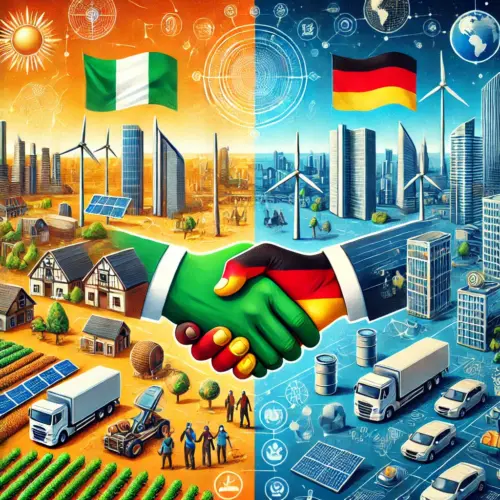
Nigeria, Africa’s largest economy, and Germany, the leading economy in the European Union, have reached an agreement to enhance their bilateral relationship, focusing on key areas such as sustainable economic development, agricultural transformation, energy, climate action, population management, and employment. This strengthened partnership also encompasses initiatives in peacebuilding and conflict prevention, further solidifying the long-standing cooperation between the two nations.
The announcement was made during a meeting in Abuja, Nigeria’s capital, where Senator Abubakar Bagudu, Nigeria’s Minister for Budget and Economic Planning, hosted Svenja Schulze, Germany’s Minister for Economic Cooperation and Development. According to Folasade Boriowo, the Ministry’s Director of Information, the discussion highlighted the importance of these sectors in fostering mutual growth and addressing shared challenges.
Trade between Nigeria and Germany has been vital for both countries, with Germany being one of Nigeria’s key trading partners in Europe. Nigerian exports to Germany have fluctuated in recent years, with the country exporting goods worth approximately N348.59 billion in the first three quarters of 2023. On the other hand, Nigeria’s imports from Germany were valued at N449.19 billion over the same period, illustrating the reciprocal nature of the trade relations. These figures underscore the importance of maintaining robust economic ties between the two countries.
During the meeting, Senator Bagudu emphasized several critical areas for collaboration, including advancing sustainable economic practices, boosting employment, reforming agri-food systems, tackling climate change, improving energy access, and promoting health and social protection policies. He also mentioned that both nations would review their future cooperation annually to ensure continued alignment of their development goals. Minister Bagudu expressed confidence that these discussions would significantly contribute to the prosperity of both countries.
Minister Svenja Schulze reaffirmed Germany’s dedication to supporting Nigeria’s economic aspirations, committing resources through the Development Cooperation Partnership, which has existed since 1974. This partnership aims to facilitate mutual progress through technical and financial support, tailored to meet the evolving needs of both nations.
In response to the changing global landscape, particularly the ongoing Russia-Ukraine conflict, the Nigerian government has underscored the importance of Nigeria’s vast natural gas reserves—estimated at over 202 trillion cubic feet—as a strategic asset. These reserves hold the potential to significantly contribute to Germany’s energy needs, especially as the European country grapples with the effects of the conflict on energy supplies and its broader economic stability. Germany’s economy is forecast to grow by 0.3% in 2024, a modest recovery following a contraction of 0.3% in 2023 due to challenges such as high inflation and energy price hikes.
This partnership, which dates back over four decades, is now poised for further growth as both nations recognize the importance of adapting to the changing global context. In August 2023, both governments agreed to review and update their Technical Cooperation Agreement to ensure it continues to serve the evolving needs of both countries, marking a significant step in their long-term partnership.


